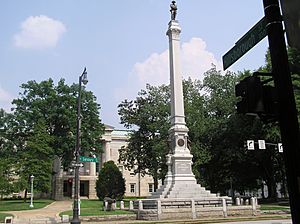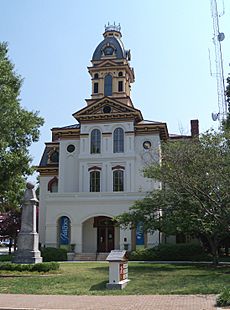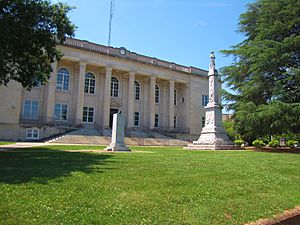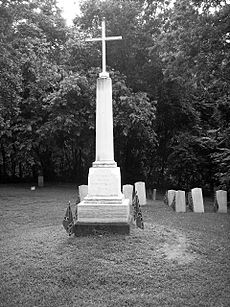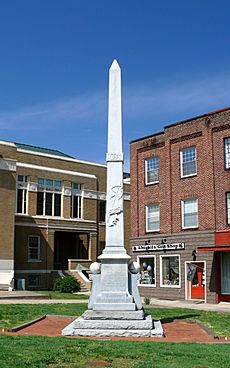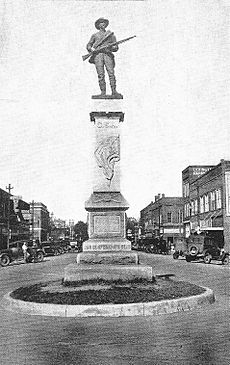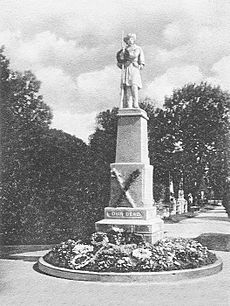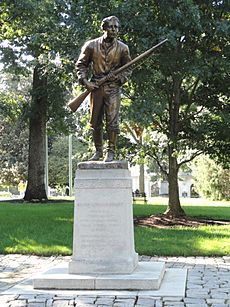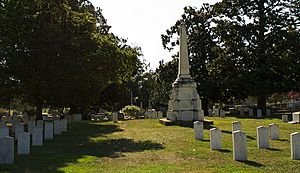List of Confederate monuments and memorials in North Carolina facts for kids
This article is about the many monuments and memorials in North Carolina that honor the Confederacy. These symbols include statues, flags, special holidays, and the names of schools, roads, and parks. They were created to remember the Confederate States of America (CSA), its leaders, and soldiers from the American Civil War.
It's important to know that this list does not include things like historical markers or battlefield parks if they were not made to honor the Confederacy. It also doesn't include people connected to the reasons for the Civil War or white supremacy if they weren't directly part of the Confederacy.
There are at least 140 public places in North Carolina with Confederate monuments. Governor Roy Cooper has asked for these monuments to be removed. He also wants to change a 2015 law that makes it hard to remove them without special permission.
Contents
Monuments at the State Capitol
The North Carolina State Capitol building in Raleigh used to be where the state government met. In 2017, Governor Roy Cooper tried to move three Confederate monuments from the Capitol grounds. He wanted them moved to the Bentonville Battlefield, a Civil War site.
However, a state commission said a 2015 law stopped them from being moved. The commission did suggest adding signs to explain that slavery was a main cause of the Civil War. They also agreed that there were too many monuments honoring the Confederacy at the Capitol. The commission asked the state to plan a monument to honor African Americans' contributions to North Carolina's history.
On June 19, 2020, some protestors pulled down two statues at the base of the main monument. One statue was even dragged into the street.
Important Monuments Removed
On June 21, 2020, several monuments were removed from the Capitol grounds:
- North Carolina State Confederate Monument (1895): This tall monument was 75 feet high. It honored fallen Confederate soldiers. At the top was a statue of a Confederate artillery soldier. Near the bottom were statues of an infantry soldier and a cavalryman. It had the Seal of North Carolina and inscriptions like "To Our Confederate Dead."
- Monument to North Carolina Women of the Confederacy (1914): This monument honored the hard times and sacrifices of North Carolina women during the Civil War. It showed an older woman holding a book next to a young boy with a sword. The woman was meant to represent women sharing the history of the Civil War with the next generation.
- Henry Lawson Wyatt Monument (1912): This monument honored Henry Lawson Wyatt, who was the first Confederate soldier to die in battle on June 10, 1861. The sculpture was made by Gutzon Borglum, who also created Mount Rushmore.
Other Civil War Monuments at the Capitol
- A statue of Confederate Colonel Zebulon Baird Vance, who was Governor during the Civil War (1862–1865).
- A monument to Civil War Captain and North Carolina lawmaker Samuel A'Court Ashe (1940).
Confederate Monuments Across North Carolina
Many towns and counties in North Carolina have monuments honoring the Confederacy. Most of these were put up many years after the Civil War ended.
Courthouse Monuments
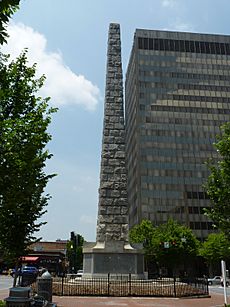
Many Confederate monuments are found on the grounds of county courthouses. These monuments often honor "Confederate Dead" or "Soldiers."
- Asheville: The Zebulon Baird Vance Monument (1896) is a tall stone pillar. The Asheville City Council voted to remove it in March 2021.
- Bakersville: Mitchell County's Confederate Dead Monument (2011) honors 79 men "who died for their freedom and independence. And not for slavery."
- Clinton: A Confederate Soldiers Monument (1916) was removed on July 12, 2020.
- Columbia: A Confederate Soldiers Monument (1902) here includes the phrase "In appreciation of our faithful slaves."
- Louisburg: The Confederate Memorial Drinking Fountain (1923) honored Orren Randolph Smith, who designed the first official Confederate flag. This fountain, and a similar one in Wilson, originally had separate drinking fountains for "white" and "colored" people. These parts have since been removed.
- Oxford: The Granville Gray monument was moved from the courthouse to the local library after protests in 1970.
- Laurinburg: The Confederate Soldiers Monument (1912) has been moved several times. It originally sat in the middle of a road and later moved to the courthouse grounds.
Other Public Monuments
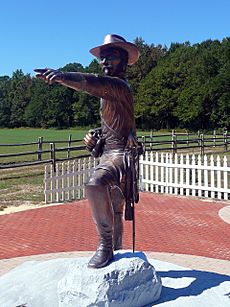
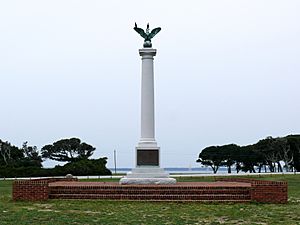
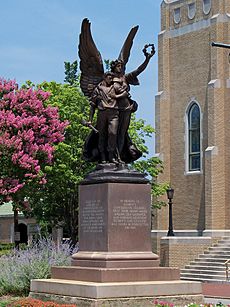
Many other monuments are located in public spaces like cemeteries or town squares.
- Bentonville: Monuments at the Battle of Bentonville site include a Confederate Monument (1895) and a Joseph E. Johnston Monument (2010).
- Charlotte: This city has several markers, including a Jefferson Davis Plaque (1960) and a marker for the 1929 Confederate Reunion.
- Fayetteville: The Confederate Soldiers Monument (1868) at Cross Creek Cemetery was the first Confederate monument in North Carolina.
- Kure Beach: The Fort Fisher Confederate Monument (1932) is located at the site of the former Fort Fisher headquarters.
- Lexington: A Confederate Soldiers Monument (1905) was removed from the public square in 2020.
- Raleigh: Besides the Capitol, the Historic Oakwood Cemetery has a Confederate Monument (1870) and graves.
- Rocky Mount: The Nash County Confederate Monument (1917) was voted to be removed by the City Council on June 2, 2020.
- Salisbury: The Gloria Victis monument (1891), meaning "Glory to the Defeated," was removed in 2020 and moved to a new location in 2021.
- Wilmington: This city has several Confederate monuments, including the Oakdale Cemetery Confederate Mound (1872), which was North Carolina's first soldier statue.
Private Monuments
Some Confederate memorials are on private property.
- Durham: A Confederate memorial (2015) in Maplewood Cemetery has been vandalized several times.
Buildings Named for Confederate Figures
Some buildings in North Carolina were named after people connected to the Confederacy.
- Chapel Hill: At the University of North Carolina at Chapel Hill, Carr Hall was named for Confederate veteran Julian Shakespeare Carr. It was renamed "Student Affairs Building" in 2020. Vance Hall, named for Civil War governor Zebulon Vance, is also on campus.
- Statesville: The Governor Zebulon Vance House and Museum is run by the United Daughters of the Confederacy.
Places Named for Confederate Figures
Many counties and towns in North Carolina are named after Confederate figures.
Counties
- Hoke County (1911), named for CSA Maj. Gen. Robert Hoke.
- Pender County (1875), named for CSA Gen. William Dorsey Pender.
- Vance County (1881), named for CSA soldier and North Carolina governor Zebulon Baird Vance.
- Lee County (1907), likely named for Robert E. Lee.
Towns
- Carrboro (1882), named for Julian Carr.
- Ramseur (1889), renamed for CSA general Stephen Dodson Ramseur.
- Vanceboro, named for Zebulon Vance.
- Zebulon, named for Zebulon Vance.
Natural Features and Roads
- North Carolina Confederate Veterans Forest (1956): This forest of 125,000 spruce pine trees was planted as a living memorial to North Carolina Confederate Veterans. It is located near the Blue Ridge Parkway.
Many roads across the state are also named after Confederate figures or battles. For example, there are many "Robert E. Lee Drive" or "Stonewall Jackson Drive" streets.
Schools Named for Confederate Figures
Several schools in North Carolina were named after Confederate figures. Some of these names have been changed.
- Asheville: Vance Elementary School is now Lucy S. Herring Elementary School.
- Charlotte: Zebulon B. Vance High School is now Julius L. Chambers High School.
- Henderson: Several schools still carry the Vance name, such as Kerr-Vance Academy and Vance County High School.
- Raleigh: Vance Elementary School and a reference to "the winds of Dixie" in the school song at North Carolina State University have been points of discussion.
|
 | Leon Lynch |
 | Milton P. Webster |
 | Ferdinand Smith |


